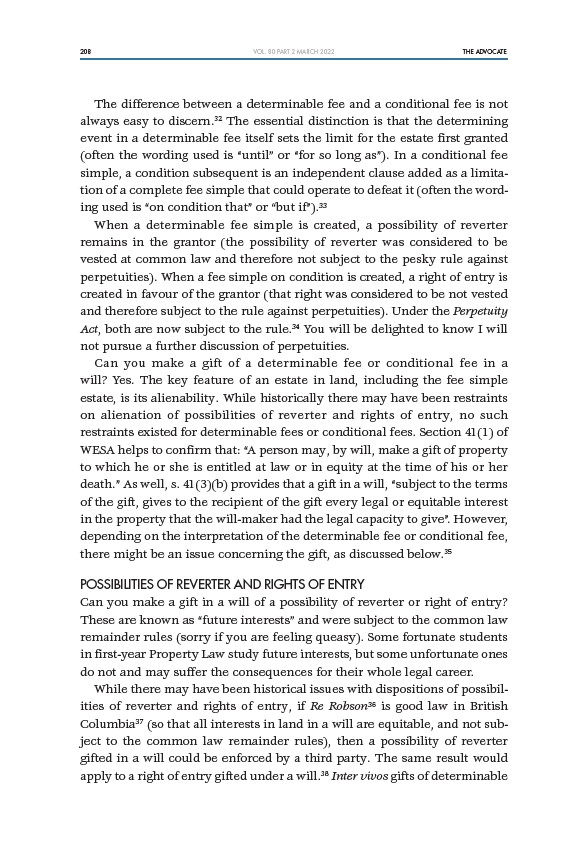
208 THE ADVOCATE
VOL. 80 PART 2 MARCH 2022
The difference between a determinable fee and a conditional fee is not
always easy to discern.32 The essential distinction is that the determining
event in a determinable fee itself sets the limit for the estate first granted
(often the wording used is “until” or “for so long as”). In a conditional fee
simple, a condition subsequent is an independent clause added as a limitation
of a complete fee simple that could operate to defeat it (often the wording
used is “on condition that” or “but if”).33
When a determinable fee simple is created, a possibility of reverter
remains in the grantor (the possibility of reverter was considered to be
vested at common law and therefore not subject to the pesky rule against
perpetuities). When a fee simple on condition is created, a right of entry is
created in favour of the grantor (that right was considered to be not vested
and therefore subject to the rule against perpetuities). Under the Perpetuity
Act, both are now subject to the rule.34 You will be delighted to know I will
not pursue a further discussion of perpetuities.
Can you make a gift of a determinable fee or conditional fee in a
will? Yes. The key feature of an estate in land, including the fee simple
estate, is its alienability. While historically there may have been restraints
on alienation of possibilities of reverter and rights of entry, no such
restraints existed for determinable fees or conditional fees. Section 41(1) of
WESA helps to confirm that: “A person may, by will, make a gift of property
to which he or she is entitled at law or in equity at the time of his or her
death.” As well, s. 41(3)(b) provides that a gift in a will, “subject to the terms
of the gift, gives to the recipient of the gift every legal or equitable interest
in the property that the will-maker had the legal capacity to give”. However,
depending on the interpretation of the determinable fee or conditional fee,
there might be an issue concerning the gift, as discussed below.35
POSSIBILITIES OF REVERTER AND RIGHTS OF ENTRY
Can you make a gift in a will of a possibility of reverter or right of entry?
These are known as “future interests” and were subject to the common law
remainder rules (sorry if you are feeling queasy). Some fortunate students
in first-year Property Law study future interests, but some unfortunate ones
do not and may suffer the consequences for their whole legal career.
While there may have been historical issues with dispositions of possibilities
of reverter and rights of entry, if Re Robson36 is good law in British
Columbia37 (so that all interests in land in a will are equitable, and not subject
to the common law remainder rules), then a possibility of reverter
gifted in a will could be enforced by a third party. The same result would
apply to a right of entry gifted under a will.38 Inter vivos gifts of determinable